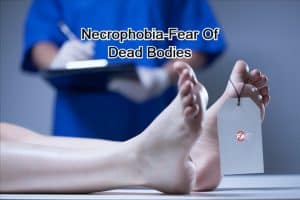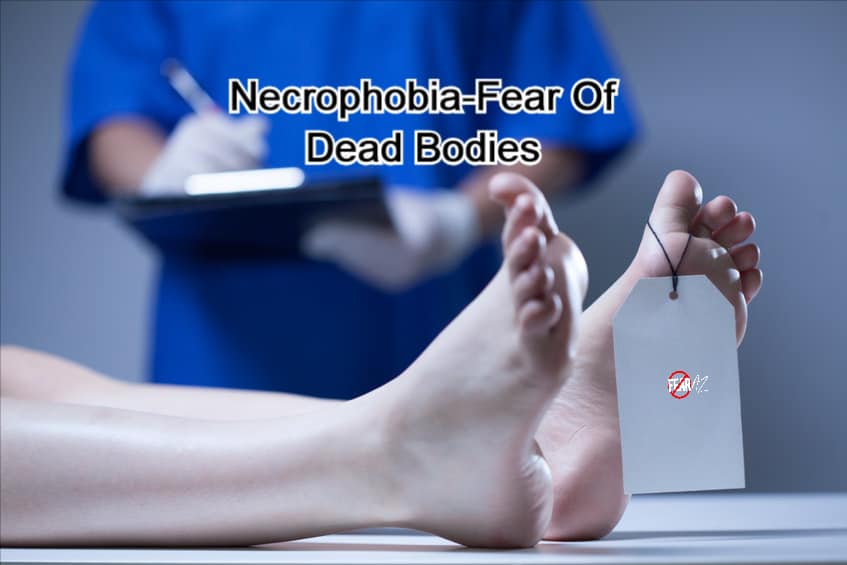Share This Article
Necrophobia – Fear of Dead Bodies/Dead Things/Dead Bodies in Water
Does the thought of a dead body send chills down your spine? Do you avoid horror movies? Do you wake up in a sweat at night after dreaming of a late family member?
Do you have a hard time dealing with Halloween? Are you terrified of caskets, corpses, and funerals? Do you hate going near rivers or lakes fearing you may see a dead body floating in the water?
If your answer to all these questions is “yes,” you may have necrophobia.
It must be difficult to discuss what you are going through, but you are not alone. About 12.5 percent of the population develop some kind of fear during their lifetime.
Living with necrophobia can be a challenge, as you are bound to come across the object of your fear at some point. Also, the pressure of being mocked and laughed at stops many from discussing it with their loved ones. However, you don’t need to worry; you can manage your fear with proper intervention.
Self-help techniques like meditation and yoga can alleviate your symptoms. Treatments like exposure therapy and cognitive behavioral therapy may be necessary if your fear has gotten out of hand. Read on to find out more.

Necrophobia Definition
Derived from the Greek words nekros for “corpse” and phobia for “fear,” necrophobia is a person’s fear of corpses and dead things. So a person who has necrophobia may experience extreme anxiety at seeing such things as dead bodies, coffins, tombstones, and graveyards.
Necrophobia is categorized as a specific phobia, which is an unreasonable and extreme fear of a particular object or scenario.
Although certain phobias are common, no statistics exist to illustrate the prevalence of necrophobia.
Now that you have understood what necrophobia is, let’s look at the causes and symptoms of necrophobia.
Causes of Necrophobia
Researchers are still not very clear about the causes of specific fears like necrophobia. They believe several factors like genetics, life events, and culture—either singly or in combination—can lead to the development of these fears.
For example, the belief that the dead return to haunt the living is quite prevalent in some cultures, playing a key role in the development of necrophobia for some.
Other causes of necrophobia include experiencing a traumatic event that exposes you to a dead body or witnessing the death of a loved one.
Any such traumatic event that includes a dead body acts as a cue for some, leading to an obsessive fear of death and dead things. Family members may also pass it down since many specific phobias are genetic.
Situations that trigger the development of necrophobia are: coming in contact with a dead body (human or animal); witnessing death; attending a funeral; or even coming across videos or images of the dead through social media and news portals.
Symptoms of Necrophobia
Necrophobia shares many of the same symptoms as other types of specific phobias. Some are aware that their dread is unfounded. However, they still experience severe symptoms and terror.
Physical symptoms include:
- Dizziness or lightheadedness
- Sweating
- Nausea, vomiting, or dry mouth
- Choking sensation
- Shortness of breath
- Shaking or trembling
- Racing heartbeat
- Tightness in the chest
- Rapid breathing
- Hot and cold flashes
- Migraines
- Increased blood pressure
Psychological symptoms include:
- Strong desire to be in isolation and hiding
- A feeling of uneasiness and loss of control
- Feeling like dying
- Fearing fainting spells
- Feeling detached from reality
People who have mild necrophobia may experience just one or a combination of a few of these symptoms. However, those with severe necrophobia may experience many or all of the symptoms listed. They may also experience panic attacks.
For these reasons, a person with necrophobia may go to great lengths to avoid experiencing symptoms. For example, if they are en route to their destination, they would not mind walking the extra miles it might take to go around a cemetery or a funeral home.
Necrophobia Diagnosis
Necrophobia is a specific phobia and should be clearly distinguished from generalized fear. Generally, many people do experience a reasonable amount of fear or uneasiness due to death, dying, and dead things. This is a normal response.
People with necrophobia may find their fear of dead things and dead bodies keeping them from going to work, going out to social events, and interfering with their daily lives.
Necrophobia should also not be confused with another specific phobia like thanatophobia, the phobia of death or dying. Necrophobia is fear associated with dead things and dead bodies, whereas thanatophobia is an intense fear of death itself.
People who have thanatophobia are terrified of becoming old, dying, and being cremated. In medical terminology, it’s referred to as death anxiety, and those with thanatophobia will take great measures to stay young and seek ways to become immortal.
So if you suspect yourself or someone close to you is experiencing the symptoms of necrophobia, encourage them to visit a primary health physician or a mental health professional for a proper diagnosis and treatment.
The diagnosis procedure involves a thorough clinical interview and is based on diagnostic guidelines laid out in The Diagnostic and Statistical Manual of Mental Disorders (DSM-5).
Self-Help
Self-help is the most accessible treatment for overcoming any kind of specific phobia including necrophobia. Read all you can about the phobia, talk to someone you trust, and manage your anxiety through relaxation techniques.
You can try relaxation methods like meditation, deep breathing, and counting backwards.
Speaking to someone going through the same thing can also be comforting. It can give you insight into how others feel and how they deal with the issue. You can join an in-person or online support group to get in touch with others who have necrophobia.
Treatment for Necrophobia
Like many other specific phobias, necrophobia doesn’t have a specifically designed treatment. However, the treatment methods generally employed for specific phobias are successful in treating necrophobia.
The most widely used treatment options are cognitive behavioral therapy (CBT), exposure therapy, relaxation techniques, and medications. You have many options available to overcome necrophobia.
Cognitive Behavioral Therapy (CBT)
Cognitive behavioral therapy targets irrational thoughts and unreasonable behaviors that lead to a phobic reaction. Through this therapy, a person learns to recognize their negative thoughts and alter the thought process. This helps them successfully replace the fear with an anxiety-free, calm response.
Exposure Therapy
Exposure therapy is another widely used treatment option. The therapist gradually exposes the individual to the source of their fear in a controlled and safe environment.
This helps the patient realize that their fear is irrational. At times, the therapist uses virtual equipment to provide the stimulus to create the same experience.
In some severe cases, a therapist may prescribe anti-anxiety and antidepressant medications for the treatment of severe symptoms like anxiety. At times, a combination of treatments may help treat the phobia.
Other treatment techniques employed for necrophobia are cognitive restructuring, systemic exposure, virtual therapy, and mindfulness therapy which can be used singly or in combination for more efficiency.
Complications with Necrophobia
Necrophobia, like many other specific phobias, can harm an individual’s social life. It may also impact their ability to cope. In severe and advanced conditions, one may find it difficult to go about their regular routines, including school and work.
People who have necrophobia often avoid situations or places that may trigger a fear response. This may eventually lead to complete social isolation.
People with specific phobias may also develop other medical conditions and disorders like depression and anxiety.
People may also resort to substance use as an attempt at self-medication and to clear their minds of unwanted thoughts and images.
Prognosis and Prevention
With support, therapy, and medication, there is generally a good prognosis for specific phobias, including necrophobia.
Prevention of necrophobia is not possible considering all the factors involved in the development of the phobia. Receiving treatment promptly is vital to avoid developing serious complications associated with necrophobia.
In Conclusion
Necrophobia can impact your social life, isolating you from your loved ones. However, you can explore self-help and other treatment options to regain control of your life.




